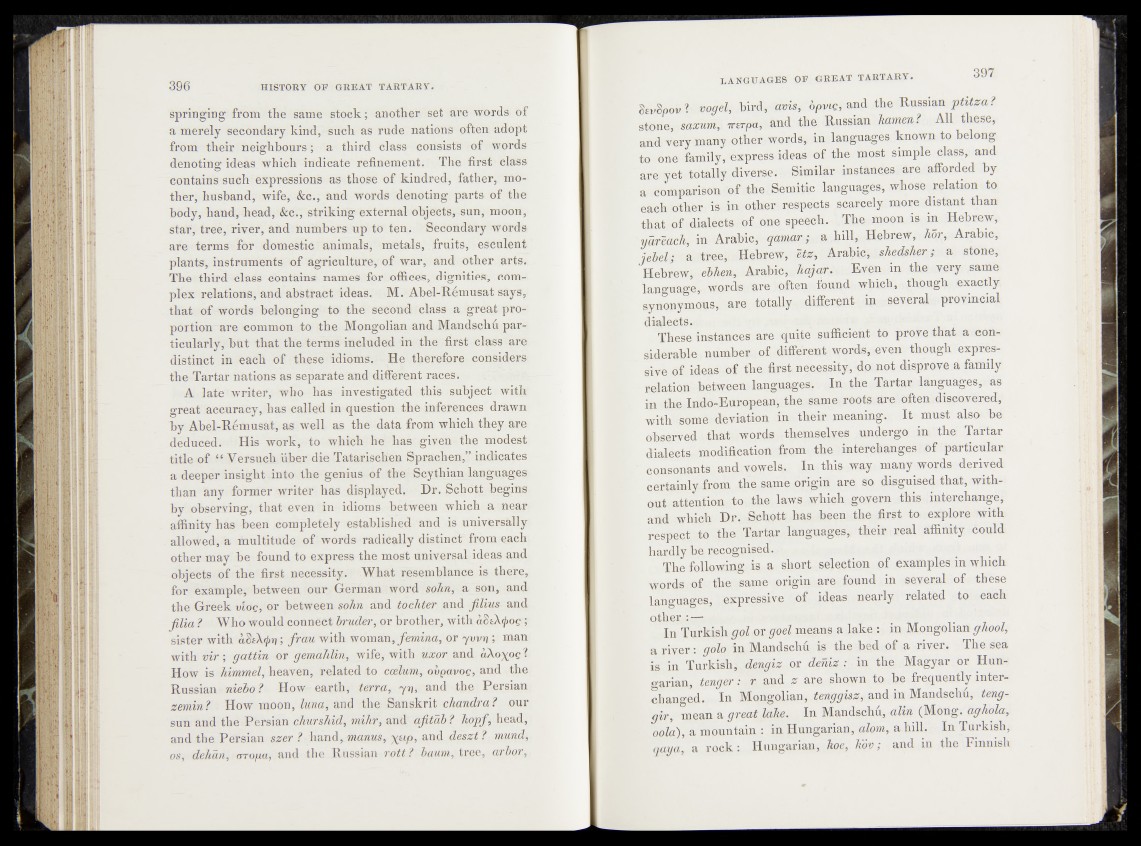
springing from the same stock; another set are words- of
a merely secondary kind, such as rude nations often adopt
from their neighbours; a third clasa consists iof words
denoting ideas which indicate refinement. The first-class
contains such expressions as those of kindred, father, "mother,
husband, wife, See., and words denoting parts of the
body, hand, head, &c., striking external objects, sun, moon,
star, tree, river, and numbers up to ten. Secondary words
are terms for domestic animals, metals, .fruits, esculent
plants, instruments of agriculture, of war, and other arts.
The third class contains names for offices, dignities, complex
relations, and abstract ideas. M. Abel-R6musat says,
that of words belonging to the second class a great proportion
are common to the Mongolian and Mandsehfi particularly,
but that the terms included in the first-class are
distinct in each of these idioms. He therefore considers
the Tartar nations as separate and different races.
A late writer, who has investigated this subject with
great accuracy, has called in question the inferences drawn
by Abel-Remusat, as well as the data from which they are
deduced. His work, to which he has given the modest
title of “ Versuch über die Tatarischen Sprachen,” indicates
a deeper insight into the genius of the: Scythian languages
than any former writer has displayed. Dr. Schott begins
by observing, that even in idioms between which a near
affinity has been completely established 'R.nd is universälly
allowed, a multitude of words radically distinct' from each
other may be found to express the most universal ideas and
objects of the first necessity; What resemblance is there,
for example, between our German word sohn, a son, and
the Greek viog, or between sohn and tochter and filius- and
filia ? Who would connect bruder, or brother, with adtXtyog;
sister with d&A^rj; frau with woman, femina, or yvvr); man
with v ir ; gattin or gemahlin, wife, with uxor and aXö%oe?
How is himmel, heaven, related to catliim, ovpavog, and the
Russian niebo? How earth, terra, -yij, and the Persian
zemm? How moon, luna> and the Sanskrit chandra? our
sun and the Persian churshid, mihr, and afitab? hopf, head,
and the Persian szer f hand, inarms, \up, and deszt ? mund,
os, dehäri, orofia, and the Russian rott? baum, tree, arbop,
fevxUpoihbWogel; birdiiMpisf opvi,g, &rid the Russian ptitza?
M M — the Russian kamerL?\ All these,
and very many other to belong
to one family,- dxptC.i^deas-of the moat- simple class, and
a r e > { y e t * t o t a l l y S im i l a r instances, are afforded by
a Comparison - jof .the &en#cc languages, wh<m relation to
each other isjiiwatbier-respects ,s0a^cely more distant than
that of dialecta-nof one tpeCCh. .The moon..is. ip Hebrew,
‘y^ddeh m Arabic#-qm m * a Arabic^
psbeU a itreei. H<|fe$et, . A^abicliS.A^gr ^.-;a stone,
Hebrew, ebhm, 9 the .very same
la n g u a g e v . word#n'are^pite^fanudf; wM ii I ^hough j exactly,
synonymous; ar(e .-totally different An several-.provincial
dialects.-y, | vij vd ■a z p i s
These-instances are quite suffiejent^tb llbre-that aeon*
siderable > numbe#i©f different words**even tho^gbTexpres-
sive of ideas^qf the* first- necessity, dAPPft dasprove a family
relation between^ languages, In ^ e # a r t a r danguhges^as
in thedndo-Hurepean, the ,sametir{M>f§a*-et‘often discovered,
with^sornmdeviation imKt-heim meaning. I t must also be
observed that words themselves undergo im’.the; Tartar
d i a l e d modification from th^kterehanges M>f; particular
' consopapts . and,vowelSf*. In this way many words derived
certainly from the same origin are so disguised that, with-;
~ qut attention to the lawsiVwhisk»goi$i3}. 4t|i^Amter)iiiiiigei
and which Dr, Schot|d>as ibeen-the first foj< explore with
respect to the Tartar ^languages,/ their, real affinity could
hardly be recognised.. - - Sj .
The following is. a short .selection of examples in which
words.,of the sameioyigimare found in several of these
languages, expressive jyof ideas - nearly related ' to each
other :— f
In Turkish gol or.goel means :a,lake in Mongolian ghool,
a river: golo in Mandschu is tbesbod of a river. The sea
is in ,Turkish; dengiz or deniz: in the Magyar or Hungarian,
tenger : \f and z are shown to be frequently interchanged.
In Mongolian, tenggisz, and in Mandschu, teng-
gir, mean a great Jake. In Mandschh, alin (Mong. aghola,
oolcOr a mountain : in Hungarian, alom, a hill. In Turkish,
qaya, a rock: Hungarian, hoe, kpv; and in the Finnish